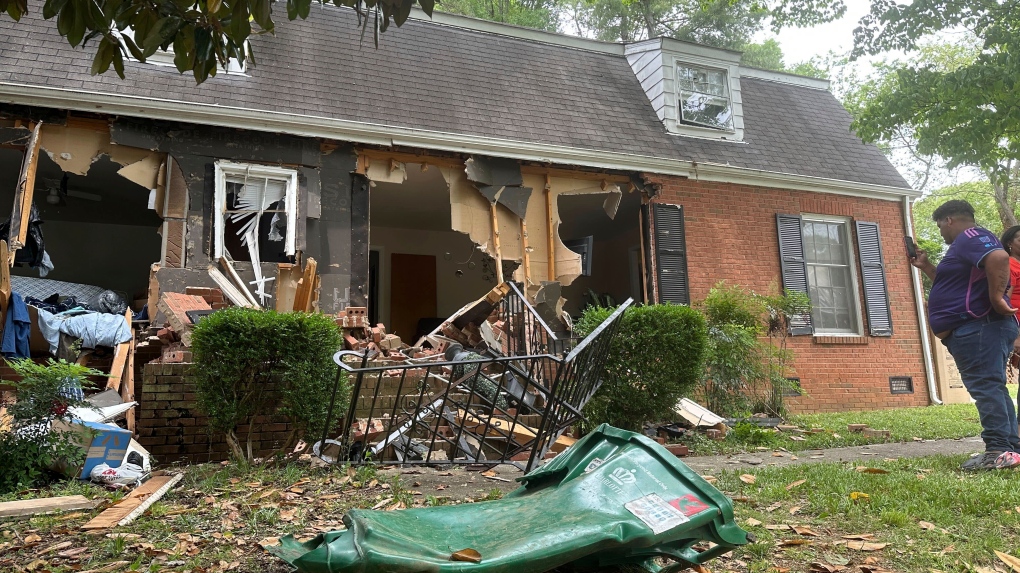Achi news desk-

CHARLOTTE, BC –
Saing Chhoeun was locked out of his home in Charlotte, NC, on Monday as law enforcement with high-powered rifles descended on his yard and garage, using a car as a shield as they were showered with gunfire from his neighbor’s address. House.
As bullets flew a few feet away, Chhoeun pulled out his phone and began live streaming the confrontation between officers and a man who wanted an ex-felon to have a firearm and flee from escaping.
By the end of the ordeal, five people, including four officers and the shooter, were dead and more injured in the deadliest single-day incident for US law enforcement since 2016.
The deadly shooting also showed how bystanders using smartphones don’t always run for cover when bullets start flying. Increasingly, they are trying to live stream their perspective of the attack. Experts say the response reflects the new role viewers are playing in the smartphone age.
“It’s become kind of a social norm,” said Karen North, a professor of digital social media at the University of Southern California Annenberg.
Humans have always struggled to define the responsibilities of a bystander in a crisis situation, North said. It is not always safe to intervene, as with the situation in Charlotte, and people can feel helpless when they do nothing. Social media has provided a third option.
“The new responsibility of the viewer” in the digital age is to keep a record of what happened on their phones, he said.
“It used to be, ‘If you see something, say something,'” North said. “Now, it says, ‘If you see something, start recording.'”
Chhoeun was about to leave for work when US marshals blocked his driveway and he was forced to huddle for safety in his garage, his keys in the ignition of his truck. He crouched at the door knocking for his son to let him in with one hand and recording with the other.
Chhoeun said he would never have risked his life to shoot a video if he hadn’t been locked outside. But since it was, he thought: “Maybe I’ll live it, you know, get everyone in the world to also see that I’ve been a witness to that. I didn’t see that coming.”
Rissa Reign, a youth coordinator who lives in the neighborhood, said she was cleaning her house when she heard gunshots and walked outside to find out what was going on.
He started recording when he heard sirens, thinking he would share the video with Charlit, a Facebook group with 62,000 members where residents post about news and events. She had no idea how serious the situation was until a SWAT vehicle pulled up behind her.
“Once we were out there, it was, ‘Oh, no. This is an active situation,’” he said. “And the next thing you know, you’re in the middle of something much bigger than you thought.”
Reign saw live streaming as a way to keep the community up to date, he said.
“Seeing that really puts things into perspective and lets you know that it’s really real, not just read or heard about in the news,” he said of the live stream video. “When you see it for real, you can, you know, you know it’s real.”
Mary Angela Bock, a media professor at the University of Texas at Austin, said there are many reasons why someone might pull out their phone in a situation like the one in Charlotte. There are always going to be people who try to shoot videos because of the human attraction to violence or to catch someone in an embarrassing situation.
“There are also good reasons for good people to record police activity, or any kind of government activity for the sake of respectful citizenship, from a safe distance: to bear witness on behalf of other citizens, to bear witness on behalf of the community. ,” she said. “We’re all in this together.”
Bock, who studies people filming law enforcement, said police leaders often tell her they support the idea of respectfully distanced citizen video because it creates more of evidence. But sometimes it’s easier said than done on the ground during a crisis situation.
“Police officers will often talk about how, and this is true, video doesn’t always show the whole story. Video has to start and stop. Someone might not be there in the beginning, someone might not see the whole thing. One perspective is not the whole perspective,” he said.
“That’s why I’m advocating for people to record respectfully from afar because the more perspectives, the better when we triangulate. When we have more than one view of a scene, we have a better idea of what happened,” Bock said.
A number of federal appeals courts have upheld the right to publicly record police work.
Stephen Dubovsky, professor emeritus of psychiatry at the State University of New York at Buffalo, said for someone in that situation, connecting with others via live streaming could give them a sense of security.
“You go out there and you might be in danger, but you’re looking at it through your phone,” he said. “You look at him through the video, you’re one step away from him.”
In Chhoeun’s video, two agents can be seen taking cover behind a vehicle. Another agent is shown by a fence in his yard, falling to the ground as what appear to be bullets spray the area around him.
“He was so sad about law enforcement,” he said. “I know they’re not choosing to die in my backyard, but just doing their job. And that’s what happened to them, leaving their family behind.”
Willingham reported from Charleston, W.Va.
Ad blocking test (Why?)





Source link
Related

